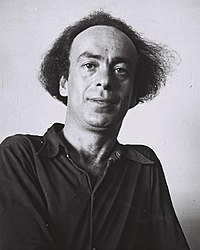Avraham Shlonsky
He contributed to Jewish cultural life with songs for satirical stage productions, as well as the Purim holiday costume balls that were a tradition in early Tel Aviv.Even at this early stage in his career as a poet, he showed a tendency for witty writing, incorporating linguistic innovations in the revived and developing Hebrew language.For years, perhaps as a result of this stance, Shlonsky's poetry was not taught in schools alongside the classic poems of Bialik, Shaul Tchernichovsky, David Shimoni, and others.[5] In 1933 Shlonsky founded the literary weekly Turim, which was identified with the "Yachdav" society in which major poets Natan Alterman and Leah Goldberg were also members.Gaponov, as editor of the Communist Party daily in an auto plant in Soviet Georgia, translated the Georgian epic The Knight in the Panther's Skin by Shota Rustaveli into Hebrew.Israeli television viewers of the time remember the image of Shlonsky stroking Gaponov's head in a loving, fatherly manner, as the latter lay on his sickbed.During the Holocaust, he published a collection of verse titled ממחשכים (From Concealing Shadows) in which he expressed his feelings from that darkest period in human history.

KryukovoPoltava OblastRussian EmpireUkraineTel AvivIsraeliHebrewRussianeditortranslationsHasidicPoltavaguberniyaKremenchukChabadVerdina ShlonskyHerzliya Hebrew High SchoolMandatory PalestineThird AliyahGdud Ha'avodaKibbutzEin HarodJezreel ValleyHa-ShiloahBialiksecond-handShaul TchernichovskyDavid ShimoniNatan AltermanLeah GoldbergDahlia RavikovitchCommunistGeorgianThe Knight in the Panther's SkinShota RustaveliFirst World Warpogromsthe HolocaustTchernichovsky PrizeEugene OneginAlexander PushkinHamletShakespeareBialik PrizeliteratureEliezer SteinmanIsrael PrizeUtzli-GutzliRumpelstiltskinWilliam ShakespeareAnton ChekhovNikolai GogolRomain RollandSong of SolomonUnited Israel AppealcuckoldryJewish National FundList of Israel Prize recipientsList of Bialik Prize recipientsThe Modern Hebrew Poem Itself